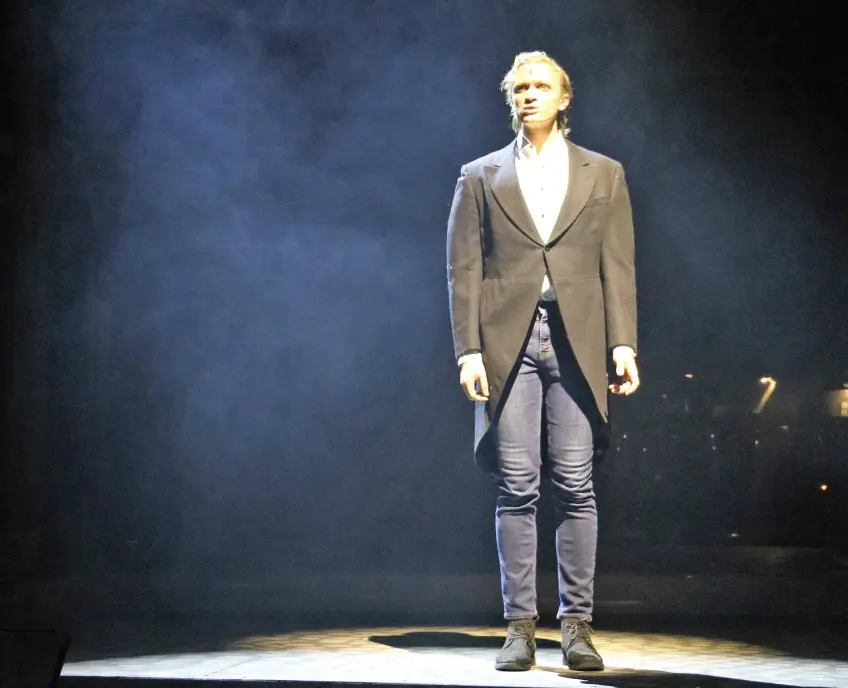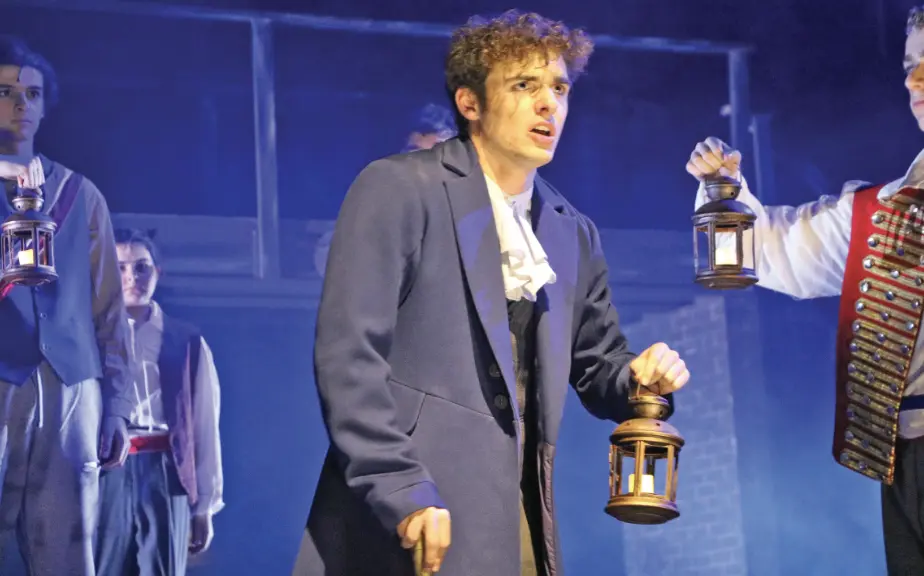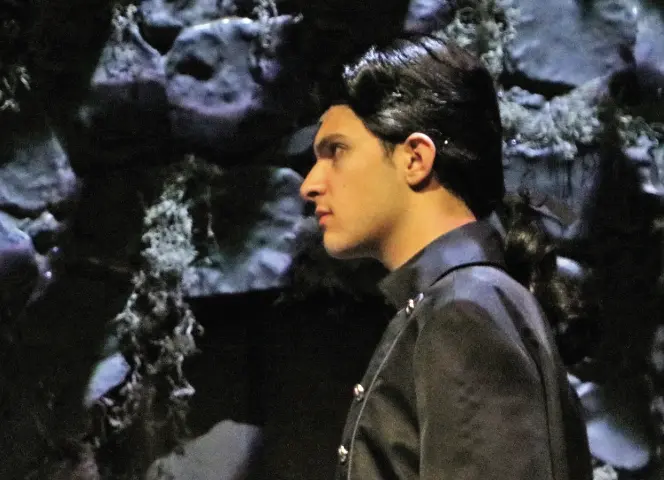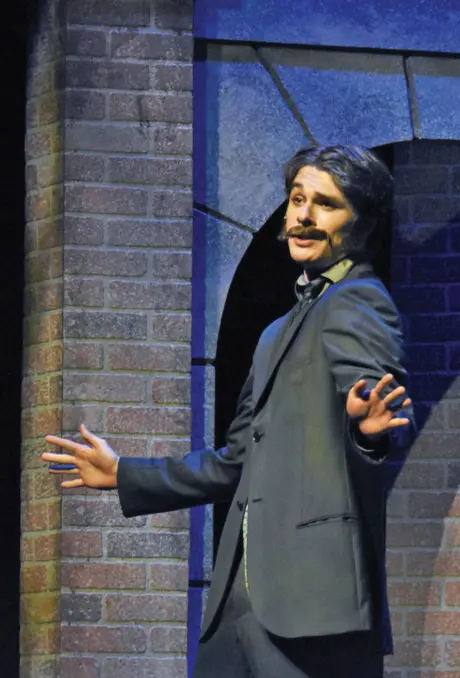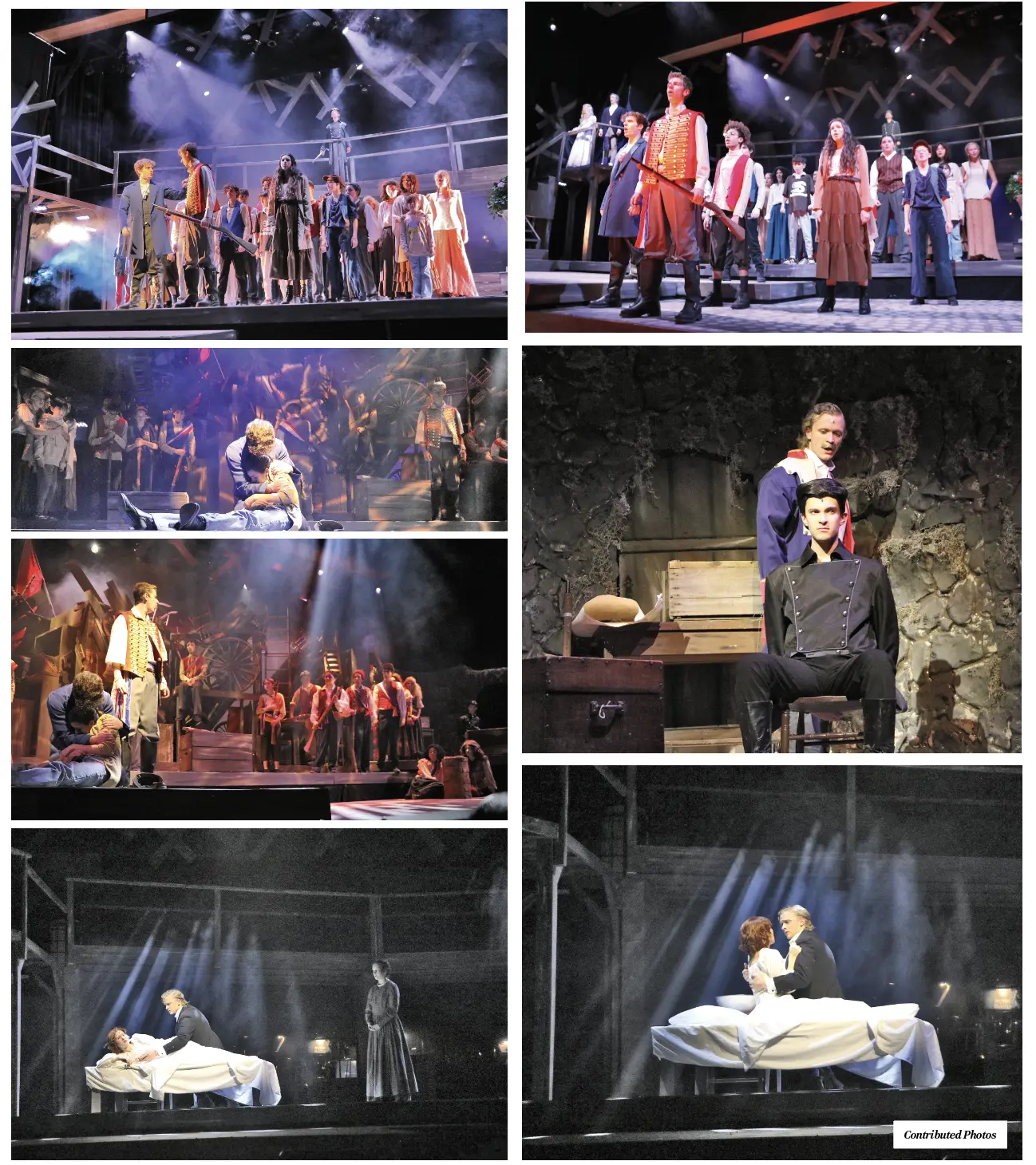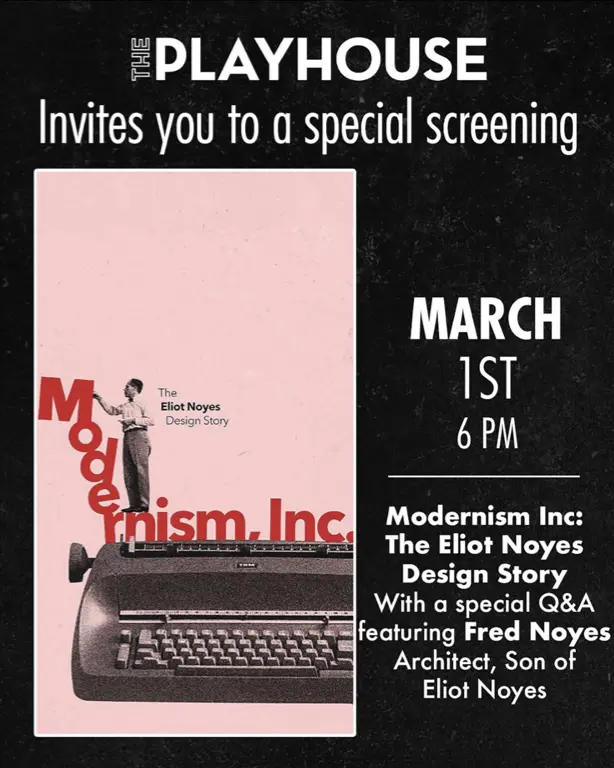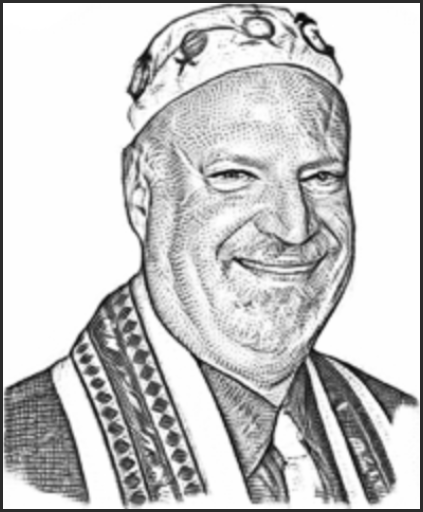By Elizabeth Barhydt
It’s a striking thing when the kids in your town do something fine and true, something that stirs not only pride but a sort of communal awe. That happens in New Canaan often. Over the past year the students of New Canaan High School’s Theatre Department received 13 Halo Award nominations—recognition not just for performance, but for spirit, craft, and the joyful labor of creation.
There was Les Misérables, that towering classic, and Jack the Ripper: Monster of Whitechapel, eerie and exacting. These two wildly different shows formed the backbone of the year, and they were rendered with seriousness and integrity. There’s nothing unserious about the young people in the theatre department. They take it all to heart, because theatre takes your heart and teaches it to beat with others.
This column comes with a correction. In our May 29 issue, a quotation was mistakenly attributed to senior Henry Tate. He never gave that quote; we regret the error. Mr. Tate responded with grace and offered his time and thoughts. He, along with his classmates and director, helped us not only to set the record straight but to understand more deeply what this work means.
Christopher Myers, the director of theatre arts at NCHS, stretched the department by choosing two demanding pieces that require nuance, stamina, and soul. The students rose.
Henry Tate played Jean Valjean in Les Misérables. That role is operatic in its scope and moral weight. He prepared with the kind of seriousness that would make any parent stop in their tracks: giving up caffeine to protect his vocal cords, warming up his voice twice a day, preserving vocal strength. He also served as scenic designer for Jack the Ripper. There’s something beautiful in a student who wants to be both center stage and backstage, who understands the value of hammer and light.
Thomas Pisant, nominated for his portrayal of Marius, spoke of how the character grows from infatuated idealist to young man marked by loss. That’s something any teenager on the cusp of adulthood can recognize—how you step out of childhood and into the world and it surprises you, may even knock the wind out of you.
Isa Temple, playing Éponine, didn’t just sing the solo. She embodied heartbreak from the moment she walked on stage. Nicholas Mohamad, the formidable Javert, brought theological depth to his performance. He saw Javert’s story not as villainy, but as a crisis of belief and identity. These kids think. They feel.
And they trust each other. Andrew Meli and Radea Raleva, playing the Thénardiers, spoke of throwing props and trusting the other would catch them. That’s not just good acting—it’s good living.
Theatre doesn’t happen in a vacuum. It happens in a town. Parents drive the late pickups. Grandparents clip the stories from the paper. Neighbors show up and buy tickets. It happens in a school where teachers like Christopher Myers know that training young people in the arts is training them for a meaningful life.
In his 2024 commencement address at Juilliard, actor André Holland said, “Art is how we learn to be brave. It’s how we figure out what we believe and how to say it.” That’s what these New Canaan students are doing. They are figuring out who they are—by stepping into the lives of others.
And so this story, though born of a correction, ends in celebration. For what is theatre, if not a way to step forward, to be seen, to speak from the soul?
The Sentinel is proud to correct the record and prouder still to share, in their own words, what this season meant to the students of New Canaan High School Theatre.
We encourage the community to sell out next year’s productions and cheer on our student thespians!
In Their Own Words
For Henry Tate – Nominated for Best Performance in a Leading Male Role in a Classical Musical (Jean Valjean, Les Misérables) and Scenic Design (Jack the Ripper)
Sentinel Question:
How did you prepare to take on the demanding role of Jean Valjean in Les Misérables?
Response: I chose to make some pretty big lifestyle changes in order to do my best at the very challenging character and role that is Valjean. I stopped my morning coffee because caffeine tightens vocal cords, I adopted a strict vocal warm-up regimen that started in the morning and then again before rehearsals began, and I avoided scenarios where I would have to use my voice strenuously in the week leading up to the show. There is also an immense amount of memorization that was a part of the prep, but for me it was made easier because it is all set to music. I always find it easier to memorize songs and lyrics over just lines.
Sentinel Question:
What did the Halo nomination mean to you personally after the months of rehearsal and performance?
Response: The Halo Awards have a number of judges, and not every judge comes to every show. A nomination to win means that whatever judge came to our show that night believed that, of the shows they had seen, I deserved to win best leading actor in the state of Connecticut. Past that is judges debating and equal share politics, so for me the nomination really is the win. It is very gratifying to see my work and the work of my friends appreciated by these professionals, but really for me the reactions from all of the audience members who I talk to in the weeks after the show, is what makes me the most proud. It proves to me that the work I put in had a meaningful effect on the people of our community, and sharing something special with THEM is why I continue to perform.
Sentinel Question:
You were also nominated for scenic design for Jack the Ripper. What was the design concept, and how did the team bring it to life?
Response: Our scenic designer, Kevin Gleason, created the concept of the set. The work that the students do is just the construction of it. The set consisted of a wall spanning the length of the stage built to look like a London Street, with panels opening up, letting us see into the various locations of scenes such as Winslow’s living room and the police station. The moving elements combined with excellent set dressing by our props department really brought this up to life and helped the audience feel they were really in the setting.
Sentinel Question:
How do you balance acting and behind-the-scenes design work?
Response: I have always been a proponent of learning as much as you can about as much as you can. Since my freshman year, I have been both an actor on stage as well as a music director or assistant lighting designer, or a set department head, etc., etc. We are lucky at our high school the department offers so many opportunities, and I always encourage younger students to take as many as possible. Not only are you learning the specific skill set in each new thing that you try, but also in each position there are universal skills a student can learn and apply in whatever career they may find themselves later in life. Few other extracurriculars do this as successfully. From a scheduling perspective, rehearsals happen during the week Monday through Friday for the actors and our crew work session days are on Saturdays from 9 AM to 3 PM.
For Thomas Pisant – Nominated for Best Performance in a Featured Male Role in a Musical (Marius, Les Misérables)
Sentinel Question:
Marius goes through a major transformation in the show—what part of his journey did you most connect with?
Response: What I connected with most in Marius’s journey was how much he grows up. At the start, he’s kind of caught up in his own world—falling in love, serious about his cause but still fairly innocent with his friends. But by the end, he’s experienced real loss and has to face some really tough emotions. I think that shift—from being a little naive to suddenly having to deal with things like grief and responsibility—is something a lot of people my age can relate to. We’re all kind of figuring out who we are while the world around us gets more complicated. Playing Marius helped me think about those things in a deeper way, and it truly felt like as I evolved this character to overcome adversity and grow as a human, I myself was doing just that.
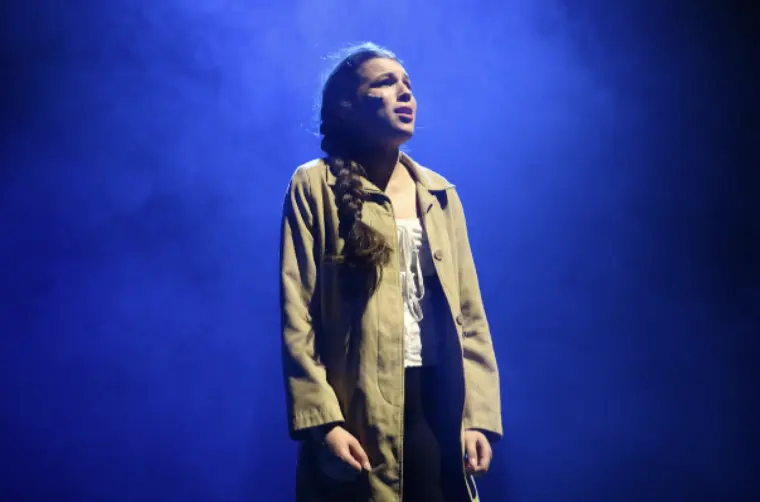 For Isa Temple – Nominated for Best Performance in a Featured Female Role in a Musical (Éponine, Les Misérables)
For Isa Temple – Nominated for Best Performance in a Featured Female Role in a Musical (Éponine, Les Misérables)
Sentinel Question:
Éponine is a fan-favorite character. How did you make the role your own?
Response: Éponine is often portrayed as a tough, street-smart girl, and while I definitely wanted to keep that side of her in my portrayal of the role, I also made it a focus of mine to really tap into her emotional vulnerability from the start. Éponine’s famous solo, “On My Own” is a moment where her heartbreak is undeniable in any adaptation of the show, but finding moments to let her guard down before that number was just as important to me as my execution of the solo itself. I added my own small touches leading up to and beyond Éponine’s emotional climax, which included shifts in tone, subtle reactions to Marius’ touch, and simply the way I looked at him—whether smiling due to his comfort or casting a sad glance after being ignored. These choices gave her character more depth from the start and allowed me to create a version of Éponine that felt layered, vulnerable, and uniquely mine. I believe the audience needs to experience Éponine’s full emotional journey—from the moment she enters the stage to the moment she dies in Marius’s arms—in order to truly feel the weight of her heartbreak, which is what I aimed to bring to life in my performance as I tried to make her my own.
For Nicholas Mohamad – Nominated for Best Performance in a Supporting Male Role in a Musical (Javert, Les Misérables)
Sentinel Question:
Javert has a powerful presence in the show. How did you find the authority and intensity required for that role?
Response: Javert’s presence through his trials and excursions in Les Misérables shapes a reality, relative to our own, of how authority’s existence invites abuse. But what is so important and grand about Javert is that his authority is not clinically abusive. In fact, with further inspection, it is difficult to argue against his assertions and course of action. His arrests, attacks, and achievements are through the lens of God and trust in the law—a system he himself climbed from the gutters of, as he reveals to Jean Valjean in #6 “The Confrontation,” being born into poverty and lacking any authority.
Knowing this, and with four years of classical vocal training under Les Mis music director Sarah Gleason, pairing the beautiful and striking melodies of Javert with the strength and presence needed wasn’t that jarring of a task for me as a musical theatre performer and actor. The difference—and the difficulty—was the vocal stamina, and finding the vulnerability of Javert when he kills himself near the end of the show.
As actors, it is our responsibility to be grounded, present, and not to “black out” in our feelings as we perform. Often, actors leave auditions and the stage not being able to recall moments of their performances because they tell themselves to “run with it,” to bring emotional backing—and it ends up blinding them and their audience to a real human experience. That lesson, which I attribute to my acting coach Anna Holbrook, was one I ignored for Javert’s suicide. I see videos of myself from that number, and I don’t recognize myself. It’s as though I “blacked out” into a human whose emotional circuits were frying—not a human guided by a mission of justice in the name of Jesus Christ. Because at that time, he wasn’t grounded, he wasn’t present, Javert did not die a person. Though I admit, doing this while singing and bracing myself to fall off a bridge was no easy task.
The honor and privilege of playing Javert is unspoiled, unmatched, and unimaginable.
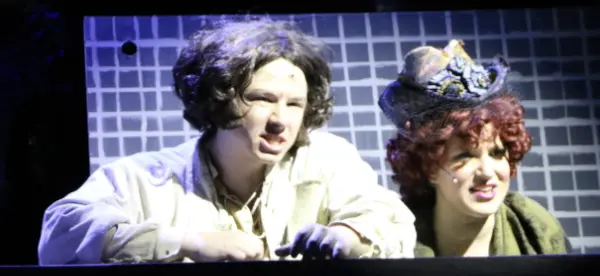 For Andrew Meli & Radea Raleva – Nominated for Best Couple or Dynamic Duo in a Musical (Les Misérables)
For Andrew Meli & Radea Raleva – Nominated for Best Couple or Dynamic Duo in a Musical (Les Misérables)
Sentinel Question:
How did you two develop the dynamic between Thénardier and Madame Thénardier?
Response from Andrew Meli: I think for a question like this, I really have to give most of the credit to Radea. In order to have a solid dynamic like that it makes it a lot easier if you have a good rapport in real life. Radea is someone who is already super friendly and brings great energy so building that rapport happened very naturally. It helped us come up with new ways to interact with each other on stage because we were comfortable enough with each other as people to just act like a fool and see what stuck. It also made the interactions more believable because there was a layer of genuine camaraderie. The other piece of it is being able to trust each other, and I think that also came easily because Radea is someone who never drops the ball. So, while I was quite literally throwing pocket watches and shoes over my shoulder I knew she’d be there to catch them. I think that also helped bring to life the idea that while Thénardier may be the frontman, Madame is really the one running the show – which is an idea our directors wanted to highlight. When it comes to those two pieces I could not have asked for a better scene partner than Radea.
Response from Radea Raleva: I, in turn, have to give a lot of credit to Andrew. In a show like Les Misérables, the Thénardiers often provide some much needed comedic relief. But Andrew was very good at balancing the comedic nature of the roles, the rotten scum of these characters, and also the weight of just how horrible some of the things they do are. Andrew is also very prepared in rehearsals and always comes with his lines down and character on point so it was very easy to bounce off and play with his actions. Sometimes I found myself getting scared when I caught his gaze as Thénardier! Lastly, in addition to being such a good actor to work with Andrew is, to his core, a good person. He has such a jolly personality and a laugh that makes all your jokes feel hilarious. It was honestly kind of off putting to act mean with someone so nice. But, honestly I think our dynamic didn’t need to develop. We clicked even at the callback – I remember walking out thinking “that was so fun”, something hard to achieve in a heavy show like “Les Miserables”. Overall, I was just so very grateful to be paired with Andrew and wouldn’t change the experience for the world.
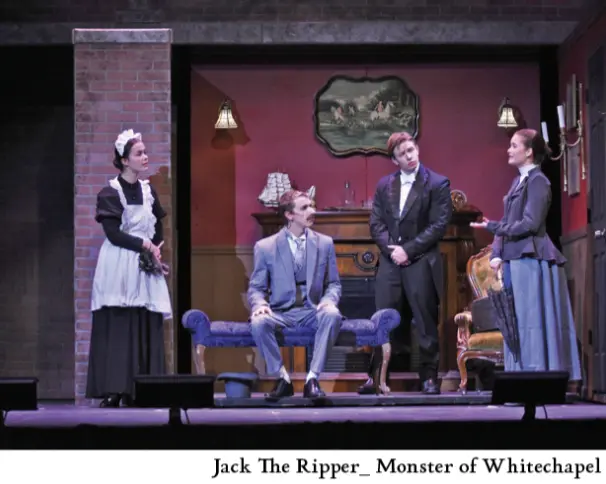 For Bennett Gropper – Nominated for Scenic Design (Jack the Ripper)
For Bennett Gropper – Nominated for Scenic Design (Jack the Ripper)
What were the biggest technical or creative challenges you encountered?
Response: Creating a set that was both functional and looked appropriate to the time period. At that time, France was very dirty and gross but it is important to make sure the stage does not just look brown and black. Incorporating unique structures broke up the darkness.
For Jack Dooley – Nominated for Best Comic Male Role and Best Standout Performance in a Male Role (Jack the Ripper)
Sentinel Question:
How did it feel to be recognized in two categories for the same role?
Response: It feels rewarding to know that the judges enjoyed this role, and It’s a testament to the power having a fun rehearsal process can produce.

